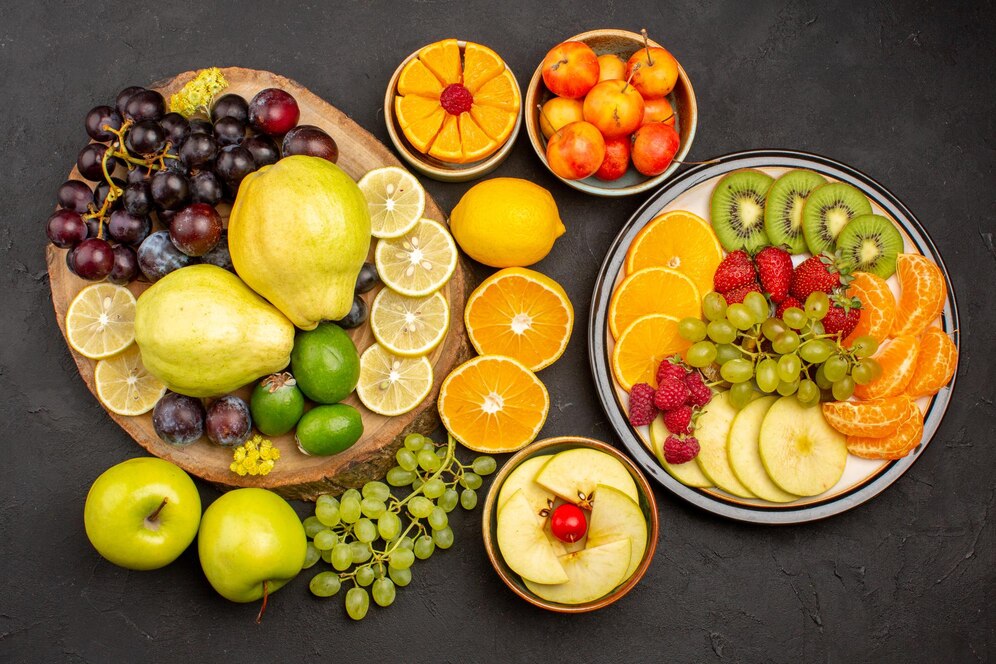Debunking 7 Popular Myths About Eating Fruits

One natural way to boost your physical health is to keep a stock of fresh fruit baskets at home. Including refreshing fruits in your diet can improve several bodily functions. It can promote your health, regulate blood circulation, and boost your immunity. This is because fruits are packed with essential nutrients which are necessary for promoting a healthy body. However, there are several misconceptions surrounding how you can eat fruits and many people fall prey to such false information. No worries! This blog is here to debunk 7 popularly believed myths so you never have to second-guess while eating your favourite fruits!
7 Myths About Eating Fruits
1. Fruits Must Be Eaten On An Empty Stomach
It is popularly believed that nutrients from fruits are not effectively absorbed by the body when they are eaten after a meal. It is true that fruits regulate and slow down the process through which the stomach releases food particles for the intestine to absorb nutrients from them. However, fruits have no control over the digestive process which continues unaffected. Thus, whether you eat your fruits on an empty stomach or a full one, the intake of nutrients remains the same. Even when you consume fruits with a meal, the body effectively digests and absorbs any available nutrients.
Also Read: 25 Exotic Fruits You Might Not Know About
2. People Suffering From Diabetes Must Refrain From Eating Fruits
People suffering from diabetes are warned to stay away from eating fruits because they contain bad sugars. However, eating whole fruits offers a minimal amount of harmful fructose than artificially sweetened beverages. Fruits are rich sources of fibre which slows down the process of absorbing sugar into your bloodstream. Moreover, fruits do not contain enough sugar to cause a spike in your blood glucose levels. With this being said, diabetic people must keep a close watch on when they are eating, instead of what they are eating.
3. Fruits Should Not Be Eaten Before Sleeping
The common misconception here is that our bodies hit a pause in their digestive processes when we are sleeping. Thus, if we consume fruits right before going to bed, instead of effective nutrient absorption, the body will store them as fat. This will lead to unhealthy weight gain. However, the body continues its regular functions regardless of the activity it is involved in. Rather, it is quite healthy to include different fruits with your meals to regulate your body weight.
Also Read: Which is the Best Time To Eat Fruits?
4. Afternoon Is The Right Time To Consume Fruits
Just like it is believed that our digestive process takes a break when we sleep, another belief says that our body needs to regain its efficiency after waking up before it can absorb nutrients. When afternoon rolls in, the body is in perfect condition to absorb nutrients from the fruits you consume. However, this is just a myth. There is no right time for you to consume fruits. According to scientific evidence, you can include fruits in your diet with any meal of the day. The timing of your day does not affect the way your body processes the food and absorbs nutrients. Instead, our body is always actively burning calories and effectively absorbing nutrients.
5. Frozen Fruits Have Low Nutritional Value
According to popular belief, frozen fruits have lower nutritional value than fresh fruits. While it is recommended to consume fresh fruits for a rejuvenated body, frozen fruits equally serve the purpose of providing your body with essential nutrients. Sometimes, handpicked fruits are kept frozen so that their condition stays intact. However, this does not affect their nutritional values.
Also Read: 15 One Seed Fruits To Include In Diet
6. Fresh Fruits And Dried Fruits Have No Difference In Nutritional Content
Fresh fruits are rich in Vitamin C, and minerals, and have a high content of water. When these are processed to form dry fruits, the vitamin C and water content is completely lost. Dry fruits are also rich sources of several vitamins and minerals, but there is an obvious difference in their nutritional content. They have more fibre and concentrated sugar. Dry and fresh fruits serve different purposes because of their differing nutritional content.
7. Drinking Fruit Juices Is Healthier Than Consuming Whole Fruits
Drinking fruit juice is believed to facilitate the process of nutrient absorption for your intestine because it gets rid of fibre. Thus, fruit juices are believed to smoothen and quicken the digestive process while also boosting immunity, removing toxins from the body, and reducing the risk of cancerous growth. However, there is no scientific evidence to prove that juices are better than whole fruits. On the other hand, the fibre content of whole fruits is essential for the body. While juices may retain most nutrients, it does provide fibre which aids several bodily functions.
Also Read: 33 Green Fruits To Include In Your Diet
Conclusion
Thus, there may be several myths that govern the way you can include fresh fruits in your daily nutrition intake. However, it can be concluded that you can have whole fruits anytime and anywhere. The nutritional value remains unchanged, and your body promptly absorbs all the nutrients.
Are you searching for a thoughtful gift for your friends and family? Then, look no further! Fruitsmith brings to you healthy hampers filled with refreshing fruits! Surprise your loved ones with handpicked goodies from Nature and revitalize their day with joy!












